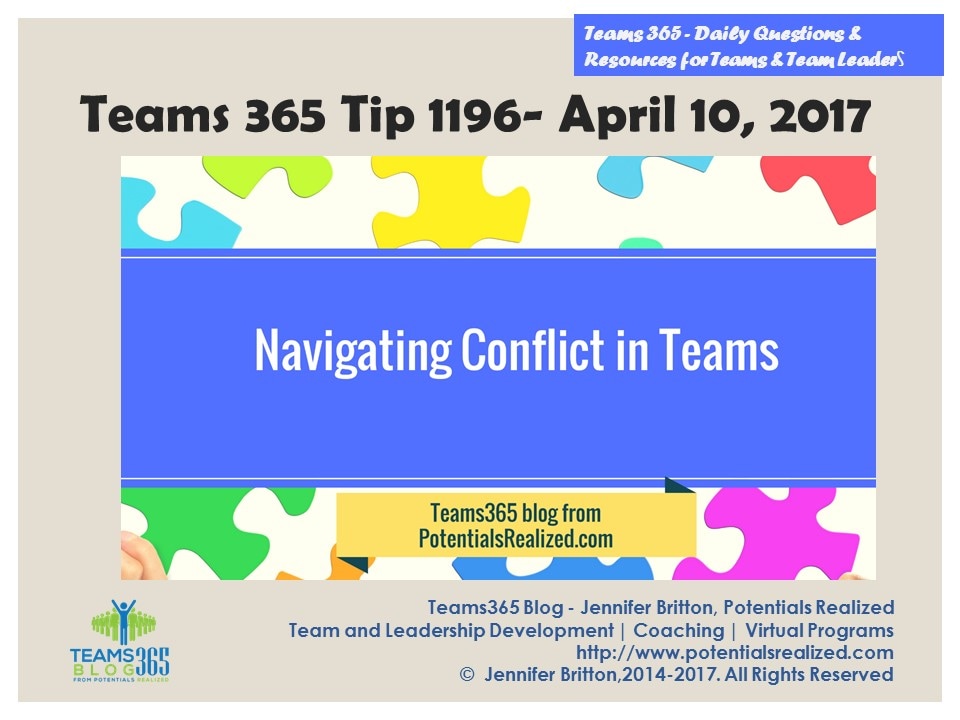Conflict in teams can emerge for many reasons including:
- Competing demands
- Unclear roles
- Lack of clarity around where we are going – our vision, our goals
In navigating conflict, you will want to consider these questions:
What is more important here - the end result or the relationship? This will influence everything from our stance and approach to conflict. For example, if the end result is really , really important in the short term I may adopt a stance of competition where I do everything I can to “win” at the other’s expense. If the relationship is more important because I need to work with this person, or team, on a regular basis, then I may choose to collaborate. In collaborating, I may let the other party win or spend more time
What do I know about how I approach conflict? We each have our own unique approach to conflict which also shapes how we view conflict. Many team members may have been socialized that conflict is not a bad thing. In fact, part of the team development process is the storming stage where a team needs to figure out who they are, what is important and how they want to operate. That stage is naturally conflict ridden.
It can be important during the storming stage for team members to be aware of their natural approach. Are they more conflict avoidant – i.e. preferring to sweep it under the rug, or are they more head on with conflict – i.e. raising issues and placing them on the table to immediate exploration.
What is the common ground we share? A third essential area to consider when thinking about conflict in teams is What is the common ground we share. Helping people find that expanse where they do align is critical for conflict resolution. It may only be a small sliver, but helping people see the area in which they align is core.
Supporting teams through conflict.
There are some specific things we can do when supporting teams through the choppy waters of conflict. Consider these next time you are working with a team:
Normalize it. A natural part of the formation of groups and teams is conflict, and the recognition of differences. Helping teams understand that they are not alone can be useful in taking off some of the pressure of the thinking that “they are all alone”.
Give time for the team to work through it. It takes time and space to have these conversations. Prioritize this as something which does need time.
Consider the resources which will support you as a team around this. Having a common framework and skills you can all use in navigating conflict supports the process of resolution. If people don’t know how to have the conversation around conflict it can be challenging. Consider investing resources in some skill development for the team, and/or bringing someone in who can help you with this.
Focus on supporting enhanced self-awareness in the team – In today’s teaming environment we all benefit from enhanced self-awareness. Awareness around how we naturally approach work, our styles, as well as our approach to conflict. Many times teams may be experiencing conflict due to differences in work styles. If you have some team members who are driving for results, and working to get things done quickly, whereas others want to make sure things are done correctly, conflict is likely. Helping team members understand their natural style can be of great benefit, and may reframe differences to simply differences, rather than something which is wrong or a problem.
Consider the end result. Sometimes it is very easy to get mired in our own perspectives, and what needs to happen. Helping team members reconnect with the end result is critical for success. Connecting with the bigger picture, also helps team members find those slivers, or 2%’s, where they do align.
What is important for your team to notice about conflict? What's the issue they need to work through?
Have wonderful start to your week,
Jennifer
Potentials Realized
Author of From One to Many: Best Practices for Team and Group Coaching(Jossey-Bass, 2013) and Effective Group Coaching (Wiley, 2010)
Team and Leadership Development | Coaching | Retreats
Five Behaviors of a Cohesive Team Authorized Partner
Everything DiSC® Authorized Partner
Contact us and let us know how we can support you in helping your team reach its' full potential - (416)996-8326

 RSS Feed
RSS Feed





